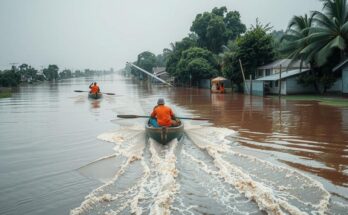Swiss Re warns that economic losses from extreme weather are climbing, particularly affecting the U.S. and the Philippines. As climate change exacerbates weather events like hurricanes and wildfires, businesses face significant financial risks. Proactive measures and pollution-reducing practices are essential to protect against potential economic fallout, as insurance options become increasingly limited.
One of the foremost global insurance providers has issued a significant warning regarding the economic ramifications of extreme weather, urging that businesses can no longer afford to dismiss these risks. Swiss Re’s press release indicated that economic losses attributed to climate change are expected to rise markedly, particularly affecting the United States and the Philippines, which are deemed among the most economically vulnerable nations against increasingly severe weather patterns.
The analysis conducted by Swiss Re across 36 nations highlights that while certain extreme weather phenomena—such as floods, tropical cyclones, severe thunderstorms, and winter storms—are not new challenges, rising global temperatures are intensifying their frequency and severity. In the United States, the projected economic loss due to such events is approximately 0.38% of its GDP, amounting to about $97 billion annually.
Jérôme Jean Haegeli, Swiss Re’s group chief economist, emphasized the importance of adapting to these changes: “Climate change is leading to more severe weather events, resulting in increasing impact on economies,” he said. He reiterated that adapting to climate risks plays a critical role in enhancing insurability, making it imperative to accurately price these risks to encourage necessary investment.
The growing threats from extreme weather have become increasingly evident. Recent years have seen the U.S. grappling with an array of extreme weather conditions, including catastrophic hurricanes and wildfires. Estimates provided by AccuWeather, as referenced by Bloomberg, predict that the combined economic impact of Hurricanes Helene and Milton could amount to $400 billion. In North Carolina alone, damage repairs are anticipated to reach $53 billion, with wildfires in 2023 resulting in losses of $89.6 billion according to IMPLAN, as cited by Forbes.
Moreover, the National Oceanic and Atmospheric Administration (NOAA) has reported that the last decade included all ten of the warmest years recorded in over 170 years. The present trajectory suggests that 2024 may surpass all previous years in terms of heat, reinforcing the notion that the impacts of climate change and extreme weather are here to stay. Businesses are thus reminded that neglecting climate action could significantly undermine their economic solidity, prompting a need for proactive measures.
To mitigate potential economic losses, businesses increasingly encounter challenges in securing financial protection against extreme weather. Many insurance firms are either raising premiums or ceasing to offer coverage altogether. Therefore, preventative strategies are becoming essential. Gene Kennedy from Savannah Trims shared insights into the importance of flood protection barriers which could save considerable costs related to property repairs.
Furthermore, businesses must adopt pollution reduction measures to diminish future risks. Transitioning from gas-powered vehicles to electric alternatives or promoting cycling among employees are prudent steps. Additionally, assessing product and packaging materials to select eco-friendlier options can significantly contribute to sustainability efforts. Not only do these initiatives yield cost savings, but they also resonate positively with consumers, encouraging them to engage with environmentally responsible businesses.
The increasing severity of climate change poses substantial economic threats, prompting leading insurance companies to take notice. Swiss Re, a major player in the global insurance industry, identified key regions, specifically the United States and the Philippines, that face heightened economic risks due to extreme weather. The insurer’s recent analysis highlights the correlation between climate-related hazards and escalating economic losses, urging businesses to adopt strategic adaptation measures to enhance resilience against these unforeseen challenges.
In summary, the warnings issued by Swiss Re underscore the urgent need for businesses to acknowledge and address the financial threats posed by climate change. As extreme weather events become more frequent and severe, proactive measures are essential in mitigating economic losses. Companies should invest in flood protections, implement environmentally friendly practices, and take advantage of adaptation strategies to foster resilience and ensure long-term sustainability. The increasing costs of insurance coverage further emphasize the importance of addressing climate risks head-on to safeguard economic stability.
Original Source: www.thecooldown.com




